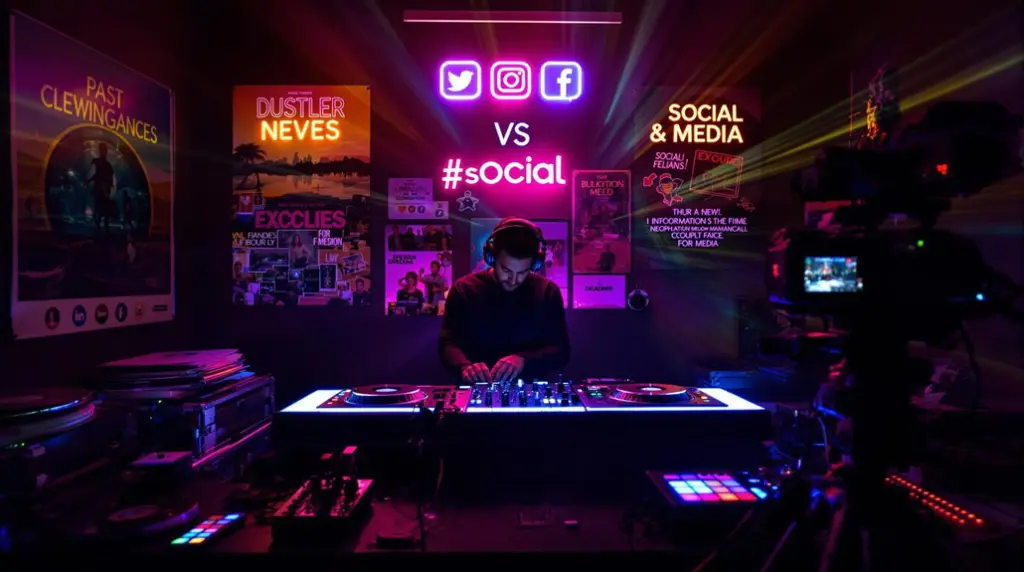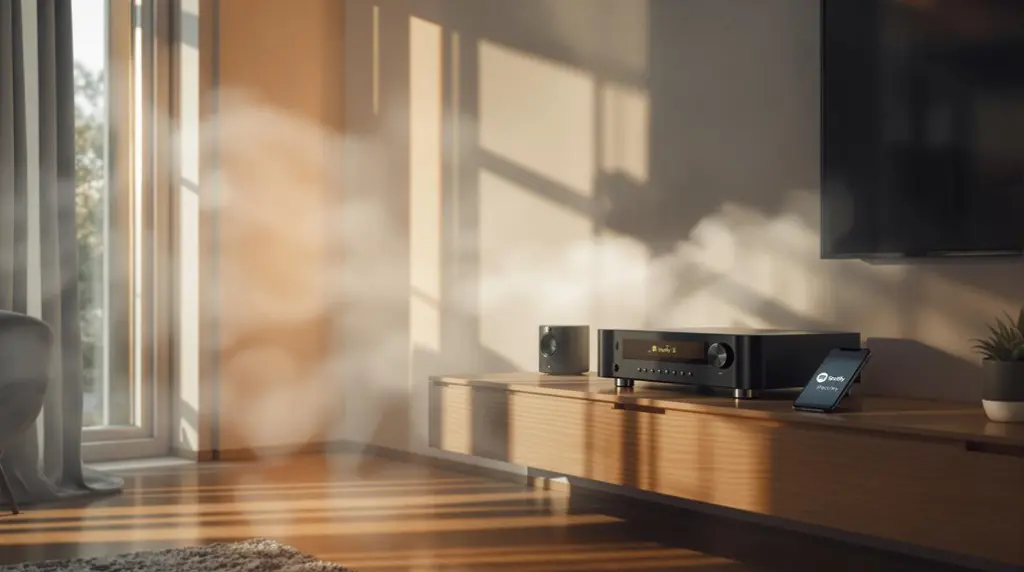DJs draw from diverse sources to curate their music collections, each with unique benefits. Download stores, like iTunes Store and Beatport, provide a vast selection of mainstream and niche tracks. DJ record pools offer exclusive edits and licensing solutions tailored for professionals. Streaming platforms such as TIDAL integrate with DJ software for seamless use during performances. Promo services grant early access to unreleased tracks from record labels, while radio shows and podcasts reveal emerging artists. Networking with peers facilitates collaborations and track sharing. Finally, physical formats like vinyl offer unparalleled sound quality. Uncover more about these strategies.
Key Takeaways
- DJs access extensive libraries through DJ record pools with subscription models offering unlimited high-quality downloads.
- Download stores like Beatport and HDtracks provide digital tracks, catering to electronic and high-resolution audio needs.
- Streaming platforms such as Beatport LINK offer DJ-centric features and integration with DJ software for seamless live performance access.
- Promo services offer early access to unreleased tracks from record labels, enhancing DJ performance quality.
- Networking with peers and attending local events allow DJs to discover new music and access exclusive tracks.
Download Stores
In the domain of professional DJing, download stores serve as a vital resource for sourcing high-quality music. These digital storefronts offer DJs access to a vast array of audio files tailored to meet the demands of live performances.
For instance, HDtracks is renowned for offering high-quality audio files in lossless formats, which appeal to audiophiles and DJs who prioritize exceptional audio quality. This guarantees that the intricacies of sound are preserved, enhancing the listening experience during live performances.
Additionally, the growing emphasis on cloud-based music libraries provides DJs with seamless access to their music collections across various platforms, supporting mobility and flexibility in performances.
Amazon Music, with its extensive catalog and competitive pricing, provides DJs an opportunity to explore a diverse range of tracks. This accessibility is essential for DJs who require a wide variety of music to cater to different audiences and events.
Meanwhile, the iTunes Store remains a dominant player in digital downloads, thanks to its thorough catalog that includes both mainstream and indie artists, making it ideal for open-format DJs.
7digital also stands out by specializing in high-resolution audio files, which are important for DJs focused on delivering superior sound quality.
Beatport, however, is the definitive choice for electronic dance music, offering an extensive library of DJ-friendly tracks and remixes, affirming its status as the leading digital storefront in this genre.
DJ Record Pools
DJ record pools stand as a pivotal resource for professional DJs, offering a legal framework that guarantees fair compensation for artists and labels through carefully structured agreements.
These platforms not only provide access to a wide array of new releases but also deliver exclusive edits that are specifically tailored to enhance a DJ’s mixing and performance capabilities.
With the rise of AI technologies in DJ software, record pools are adapting to provide tracks that work seamlessly with AI-driven mixing tools, offering DJs even more creative possibilities.
Legal Access for DJs
While the music industry continues to evolve, DJs face the critical task of sourcing music legally and efficiently, with DJ record pools emerging as an essential resource for achieving this goal. These platforms operate under robust licensing agreements, ensuring that the music distributed is compliant with copyright considerations. This legal framework not only safeguards DJs from potential infringement issues but also supports artists and labels, guaranteeing they receive due compensation for their creative work.
DJ record pools offer curated access to a wide variety of new music, providing DJs with exclusive DJ-friendly edits and remixes crucial for professional performances. Subscription-based models, like those of DJCity, BPM Supreme, and Digital DJ Pool, charge a fixed monthly fee, granting unlimited downloads of high-quality audio files in formats like MP3 and WAV. This model enables DJs to maintain an updated and legitimate music library efficiently.
Moreover, these pools often require user feedback on downloaded tracks. This feedback loop maintains a curated selection, aligning with current music trends and ensuring relevance. By engaging with DJ record pools, DJs not only access a diverse music collection but also contribute to a sustainable ecosystem that values creativity and legitimacy.
Exclusive Track Offerings
For DJs seeking a competitive advantage in their craft, the allure of exclusive track offerings from DJ record pools cannot be overstated. These pools, such as DJCity, BPM Supreme, and ZipDJ, serve as essential resources by providing subscription-based access to extensive libraries filled with exclusive remixes and DJ edits.
These tracks are designed specifically for live performances, allowing DJs to maintain a cutting-edge repertoire. As these catalogs are frequently updated, DJs can effortlessly tap into the latest music trends, ensuring their sets remain fresh and engaging.
Beyond access to unique tracks, DJ record pools are instrumental in supporting the music industry legally. By ensuring artists and labels receive fair compensation, these platforms foster a sustainable ecosystem for music creation and distribution.
Additionally, DJs participate in this cycle by offering feedback on downloaded tracks. This input is invaluable, helping pools to craft curated playlists that resonate with the evolving tastes of the DJing community.
The strategic advantage of using DJ record pools lies in the ability to build a diverse, high-quality music library. This access to exclusive content positions DJs to deliver unparalleled performances, featuring tracks unavailable on mainstream platforms, thereby enhancing their professional standing.
Streaming Platforms
As streaming platforms dominate the music consumption landscape, their compatibility with DJ software is increasingly crucial for seamless performance integration.
Platforms like Beatport LINK and TIDAL not only offer DJ-centric features but also present challenges regarding offline access, as their rental model limits track ownership.
Addressing these limitations, solutions such as SoundCloud Go+ and Beatsource Streaming provide tailored content libraries, yet DJs must strategically navigate offline capabilities to guarantee uninterrupted live sets.
Additionally, integrating services like Serato or Traktor allows DJs to leverage personalized recommendations from Spotify, enabling discovery of new tracks and enhancing their music library diversity.
Platform Compatibility and Limitations
Maneuvering the landscape of streaming platforms presents a complex challenge for DJs aiming to harness the full potential of digital music libraries. The intricacies of platform integration and hardware compatibility often dictate the usability of these services in professional DJ setups. While mainstream platforms like Spotify and Apple Music boast extensive catalogs, their lack of direct compatibility with DJ hardware limits their applicability in live performances. In contrast, Beatport LINK emerges as a DJ-centric service, offering seamless integration with DJ software and hardware, thereby providing an expansive selection of electronic music legally and conveniently. This adaptability positions Beatport LINK as a preferred choice for electronic music enthusiasts.
| Platform | Key Feature |
|---|---|
| Beatport LINK | DJ-centric integration with hardware |
| TIDAL | High-quality, lossless audio streaming |
| SoundCloud Go+ | Access to remixes and exclusive tracks |
Furthermore, TIDAL’s high-quality streaming options, with lossless audio formats, cater to DJs who prioritize sound fidelity in their performances. On the other hand, SoundCloud Go+ offers unique access to remixes and exclusive tracks from emerging artists, providing fresh material essential for dynamic sets. DJ software advancements, such as those seen in Serato and Rekordbox, have further facilitated these integrations, allowing DJs to enhance their creative repertoire directly from these platforms.
Offline Access Features
Maneuvering the domain of offline access features in streaming platforms is essential for DJs looking to optimize their live performances. Streaming services like TIDAL and Beatsource Streaming have revolutionized the way DJs handle offline library management by allowing the download of tracks for use without an internet connection.
These offline capabilities are critical for performance preparation, ensuring that DJs maintain a seamless set regardless of venue connectivity challenges.
- High-Quality Sound: Offline downloads preserve high-quality audio formats, providing professional-grade sound.
- Track Limitations: Platforms like Beatsource Streaming allow up to 1,000 tracks for offline use, necessitating strategic selection.
- Connectivity Independence: Offline features eliminate reliance on venue internet, essential for uninterrupted performances.
- Regular Updates: DJs must routinely update their offline libraries to incorporate the latest tracks and remixes.
- Efficient Library Management: Effective offline library management enables DJs to curate sets that align with current trends and audience expectations.
These features underscore the importance of meticulous offline library management, as they provide DJs with the flexibility and reliability needed for flawless performance preparation.
As streaming technology advances, DJs must adapt to these tools to enhance their craft, ensuring that their music remains at the forefront of industry standards.
Promo Services
Promo services have become an essential tool in a modern DJ’s arsenal, offering a strategic advantage by granting early access to unreleased tracks from record labels. Through well-crafted promo strategies, platforms like Inflyte enable DJs to receive exclusive content by subscribing to email lists. This early access not only helps DJs stay ahead of musical trends but also enhances their performances by delivering fresh, unreleased tracks to enthusiastic audiences.
Additionally, understanding copyright nuances is vital for DJs to guarantee legal compliance when using promo tracks. These services often provide watermarked tracks, which serve as a security measure to prevent unauthorized sharing, assuring that only legitimate subscribers can access them.
Focusing on specific genres or styles, promo services offer curated selections that align with a DJ’s unique musical preferences and needs. This targeted approach guarantees that DJs can maintain their genre expertise, providing them with the right tools to captivate their audience.
Furthermore, active DJ engagement within the music community—via social media or networking events—can increase the likelihood of receiving promotional tracks, as labels and artists seek to amplify their reach through influential DJs. By utilizing promo services, DJs not only enhance their musical repertoire but also support the artists and labels by promoting their upcoming releases.
Radio Shows and Podcasts
As DJs seek to broaden their musical horizons and stay at the cutting edge, radio shows and podcasts emerge as invaluable resources alongside promo services. These platforms, often hosted by seasoned DJs, serve as gateways to unreleased tracks and exclusive mixes, granting early access to new music weeks or months before official releases.
By engaging with DJ communities, DJs can stay informed about trending genres and discover a wider range of music through these curated playlists. Notable shows such as UOAK’s Serkora Radio and David Hohme’s Welcome Hohme Radio curate fresh sounds, offering DJs an opportunity to discover emerging artists and stay attuned to the latest trends across various genres.
The strategic advantage of engaging with radio shows and podcasts lies in their structured schedules, which offer a consistent source of new music. DJs can download episodes, allowing for convenient review and integration of tracks into their collections.
This proactive approach guarantees they remain informed about evolving music landscapes and can craft sets that resonate with contemporary audiences.
- Early access to unreleased tracks and exclusive mixes.
- Discovery of emerging artists through curated playlists.
- Consistent scheduling providing a steady influx of fresh music.
- Downloadable episodes for convenient listening and track selection.
- Insight into music trends across diverse genres and styles.
Engaging with these platforms enhances a DJ’s repertoire, fostering growth and innovation.
Networking With Peers
In the dynamic world of DJing, networking with peers emerges as an essential strategy for music sourcing and professional growth. By engaging with fellow DJs, both locally and online, there are myriad collaboration opportunities that enhance music discovery. Sharing unreleased demos and works-in-progress within a supportive community can uncover fresh tracks that keep a DJ’s setlist ahead of the curve. Local events and meetups are particularly valuable, fostering direct exchanges of music resources and personalized recommendations.
DJs can further expand their networks by utilizing online platforms and social media groups, which offer spaces to discuss trends, share playlists, and connect with like-minded individuals. These digital arenas can serve as a catalyst for discovering new artists and emerging genres.
| Strategy | Benefit |
|---|---|
| Local Events & Meetups | Personalized recommendations |
| Online Platforms & Groups | Discovery of new trends and genres |
| DJ Mailing Lists | Access to exclusive promotional tracks |
Additionally, joining DJ mailing lists provides access to exclusive promotional tracks and early releases, often circulated among community members. Forums and discussion boards are invaluable for exchanging insights and tips, leading to the discovery of hidden gems. Networking with peers not only enriches a DJ’s music library but also cultivates meaningful professional relationships that can drive career advancement.
Physical Music Formats
For DJs, the allure of physical music formats such as vinyl records and CDs lies in their unmatched sound quality and the tactile experience they provide.
Vinyl collecting is more than a hobby; it is a pursuit of aural excellence and authenticity. DJs often seek out various pressings, particularly limited editions and colored vinyl, which can raise a set with unique sound characteristics. This pursuit is not just about the music but also about supporting the broader music community. By purchasing from local record shops and markets, DJs not only discover hidden gems but also bolster independent artists.
CDs offer distinct advantages, especially in their reliability and ease of transport. For DJs who favor physical media, CDs eliminate the need for extensive digital equipment while providing consistent playback.
In addition, CDs can be an entry point for high-resolution digital formats like FLAC and AIFF, as ripping from these physical media guarantees superior sound quality during mixes.
- Vinyl records enhance sound characteristics.
- Limited editions and colored vinyl raise DJ sets.
- Local record shops support independent artists.
- CDs offer reliability and ease of transport.
- Physical formats guarantee superior sound quality when digitized.
Frequently Asked Questions
How Do DJS Get Unreleased Tracks?
DJs acquire unreleased tracks through exclusive releases and promotional access by engaging with promo services, joining mailing lists, and leveraging industry networks. These strategies allow DJs to stay ahead, offering unique and innovative music to their audiences.
Where Do DJS Get Their Music Files?
DJs obtain music files through diverse channels such as music libraries, digital downloads, and vinyl records. They leverage online platforms, promotional emails, and music subscriptions for genre exploration, ensuring a rich, curated selection to enhance their sets.
How Do Club DJS Get Their Music?
Club DJs obtain music through DJ music platforms offering licensed tracks, ensuring compliance with music licensing regulations. They leverage DJ pools, streaming services, mailing lists, and network collaborations to access exclusive releases, remixes, and high-quality audio files.
Where Do DJS Get Their Samples?
DJs acquire samples through sample libraries, offering royalty-free options that guarantee legal usage. Utilizing platforms like Splice, Loopmasters, and production software, they access diverse genres, enhancing creativity while maneuvering copyright intricacies with industry tools like sample clearance services.
Conclusion
To summarize, DJs employ a multifaceted approach to sourcing music, utilizing both digital and physical avenues. Download stores and DJ record pools provide curated selections, while streaming platforms offer vast accessibility. Promo services and radio shows, along with podcasts, present opportunities for discovering new releases and emerging artists. Networking with peers facilitates the exchange of exclusive tracks and industry insights. Additionally, physical music formats remain a cherished medium for enthusiasts, ensuring a thorough and diverse music collection.




